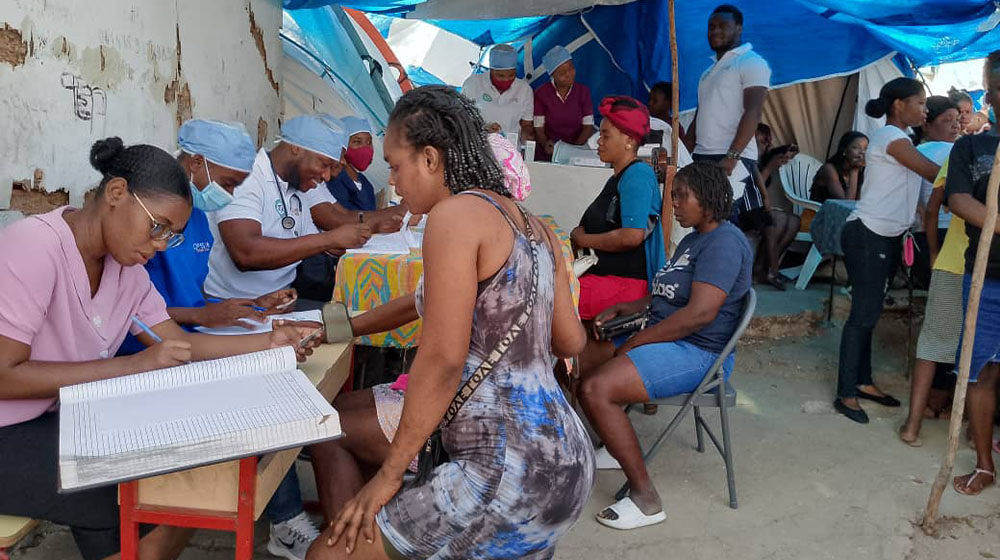News
“Haïti must rise from her ashes”: Health workers on the front lines of a spiralling crisis
- 28 March 2024
News
PORT-AU-PRINCE, Haïti – The National Institute for Midwifery in Haïti's capital usually trains around 80 midwives per year, who go on to help thousands of pregnant women deliver their babies safely.
But when armed gangs stormed and looted the institute in Port-au-Prince at the end of February, students and staff fled in terror; many are not sure if or when they will ever be able to return.
With the latest alarming upsurge in gang violence, health facilities are coming under near-constant attack, stripped of their equipment, medicine and even ambulances. Most have been forced to cease operating and staff are now displaced, leaving essential health care, social services and psychological assistance dangerously scarce for most people in the capital.

“The few facilities still open are not fully functioning,” explained Marie Suze Albert, UNFPA’s national midwife adviser in Haïti. “Not all staff can get to work. Sometimes midwives have to stay up to three days on site to provide care, without being able to return home.”
Health services are now extremely limited, just as two out of every five Haitians need urgent access to them. UNFPA estimates that if the violence continues, around 3,000 pregnant women in Port-au-Prince will be cut off from essential support, of whom some 500 will likely experience complications and need emergency obstetric care, including Caesarean sections.
The largest public health facility in the capital, the State University Hospital, has closed, along with 12 of the 15 health facilities supported by UNFPA. The remaining hospitals are overloaded, and armed groups controlling the main roads are disrupting supply routes for essentials such as food, water, medicine and blood supplies. Safe shelter is increasingly hard to find for millions.
To reach those most in need, UNFPA and partners have deployed two mobile health teams across five displacement sites in Port-au-Prince. Dr. Batch Jean Jumeau, president of the Haitian Society of Obstetrics and Gynaecology, described the conditions as “traumatic – people are extremely vulnerable. As a health worker, I try to help as best I can, providing necessary care and psychologically assisting displaced families.”
The hardships are contributing to complications, the doctor said: “I saw several women who had to give birth by Caesarean section before their due date, because of stress and high blood pressure caused by insecurity and repeated massive displacements.”
The mobile units are currently seeing between 150 and 170 people – primarily women – every day. They are also providing food and hygiene kits, awareness-raising on the services available, and psychosocial support and emergency shelter in cases of rape and other forms of gender-based violence. Where necessary, the units can transfer patients to 24-hour community health centres supported by UNFPA and run by partner FADHRIS.
As health and protection systems in Haïti crumble, sexual violence has become rampant. UN estimates show an increase of 50 per cent in sexual violence between 2022 and 2023; 80 per cent of women and girls have reported being subjected to some form of gender-based violence.
“Since the increase in gang attacks we have noticed a high rate of early pregnancy, particularly in certain accommodation sites,” Dr. Jean Jumeau told UNFPA.
The risks are especially high in overcrowded displacement settings; to support survivors and those at risk, UNFPA and partners are running a hotline that provides counselling, information and referrals.
“Very often, it is women and girls in psychological distress who call,” said Yolette Jeanty, director of local women’s rights NGO Kay Fanm, which runs the hotline with UNFPA. “We listen and identify the referral centres that are open; psychologists also provide therapy remotely.
“The situation is pushing some women to resort to transactional sex, young girls are continually harassed, raped – and on top of that they are then stigmatized, insulted in the street.”

In one case, the mother of a 13-year-old girl called after discovering her daughter had been repeatedly raped by an older man known to the family. But as they were setting the procedure in motion to have the child seen by medical and psychological staff, “we went into lockdown: Several public health facilities, such as the general hospital, had to stop operating due to insecurity,” explained Ms. Jeanty.
“The child was in bad shape. As the days passed, her health worsened. We got her admitted to a private hospital, where doctors diagnosed a miscarriage that had severely affected her uterus.” Without care, her condition would quickly have turned life-threatening.
The number of people displaced has swelled to over 360,000 and half the population now face record levels of hunger; amid this catastrophe, more than 84,000 pregnant women lack secure access to health services and 1.2 million women and girls need gender-based violence protection.
UNFPA and partners have distributed hygiene and maternal health kits to displaced women and girls in five displacement sites across Port-au-Prince. Medical supplies, including post-rape kits, have also been sent to displacement sites and the Hôpital Universitaire la Paix, one of the few hospitals still functioning in the capital.
Nadège Daudier, director of the Port-au-Prince maternity teaching hospital that was attacked and stripped of its equipment by armed gangs at the beginning of March, told UNFPA, “We have no idea what to expect. Everyone is scattered… How can we rediscover the threads that bound us together?”
Even so, she continued, “we must keep going, for our families and our loved ones. Haïti must rise from her ashes.”